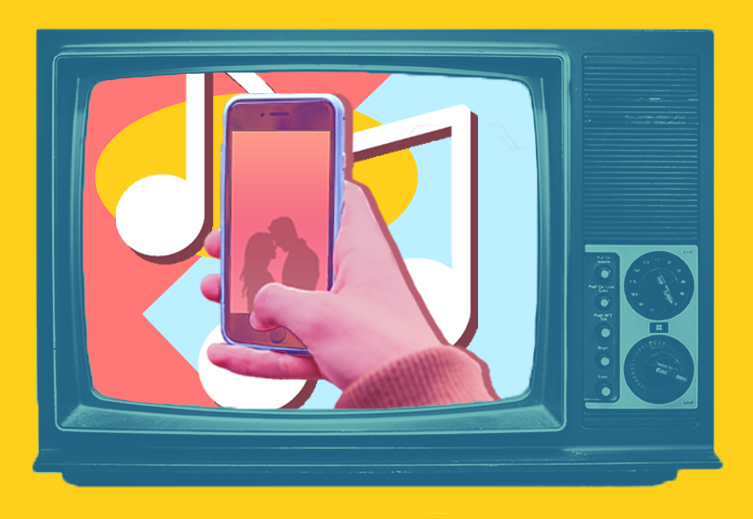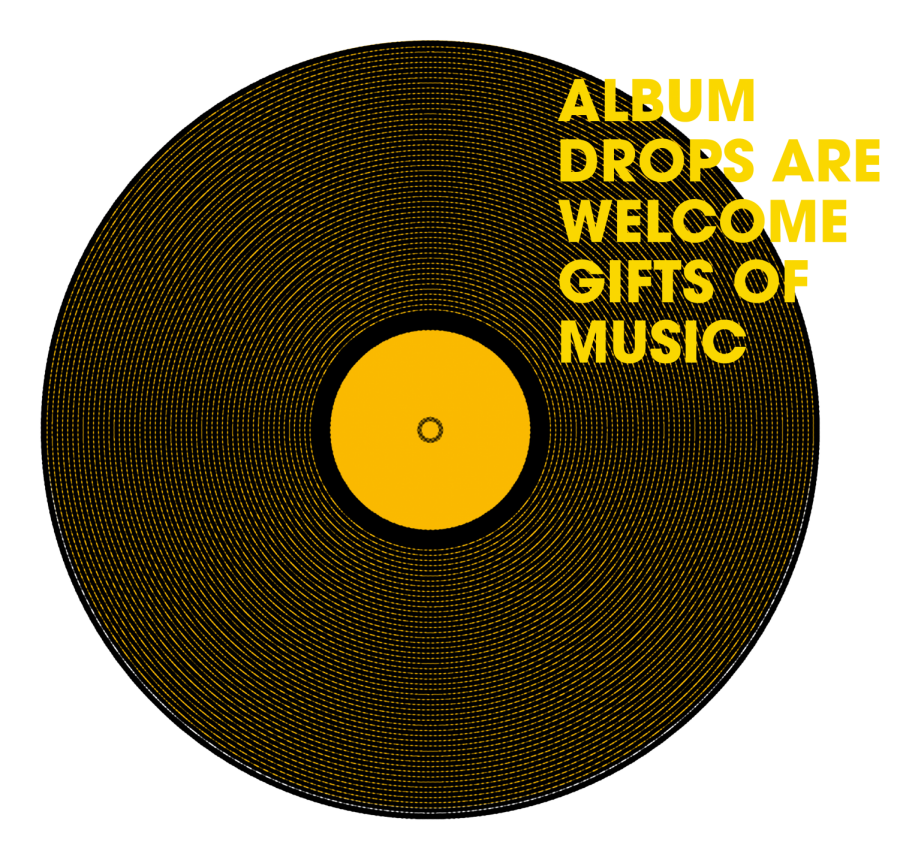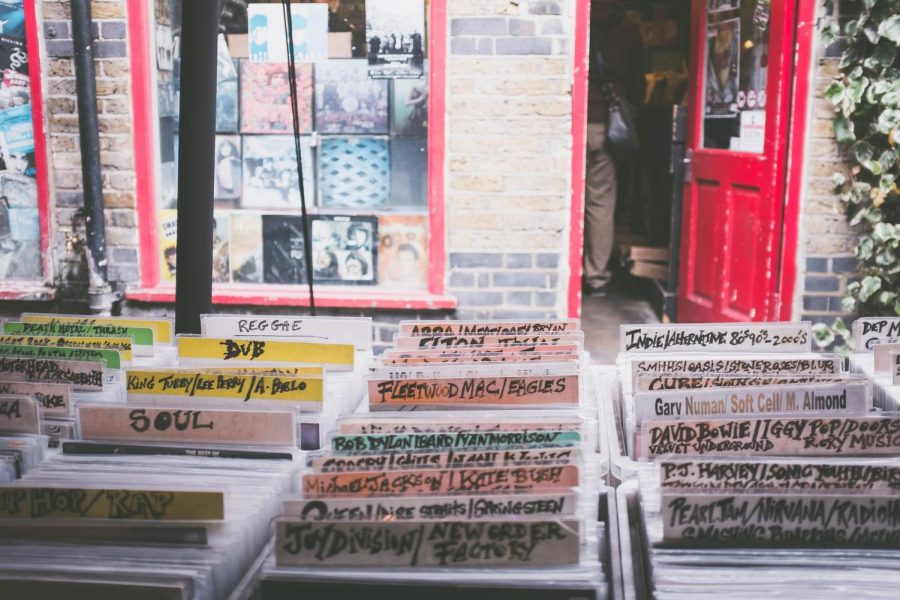(Graphic by Sydney Stam | Daily Utah Chronicle)
Head to Head: Artists Dropping Surprise Albums
March 19, 2021
Do you celebrate a midnight-drop, or do you miss the fancy announcements and lead-up?
(Daily Utah Chronicle | Piper Armstrong)
Surprise Album Drops are Welcome Gifts of Music
The surprise album drop is not anything that is new to the music industry. From the 2007 release of “In Rainbows” from Radiohead — who only gave 10 days’ notice before dropping the album — the act of giving very little to no announcements, marketing or promotion for a new album has become a standard practice for big–name artists.
With as little as 24 hours notice before an album release, the news of a surprise album drop creates huge amounts of buzz and excitement before the album is widely available. Under traditional marketing plans for album releases, each album is advertised for months before the eventual release. These traditional release schedules include the release of singles and music videos, as well as marketing surrounding the eventual release date. For surprise albums, however, an announcement may bring news of an immediately forthcoming album, or the simple release of the album could be all the announcement entails.
Let’s Focus on the Albums
Once that announcement is released — or the album simply appears on a streaming platform — the excitement for the album is extreme. When the promotion for an album is dragged out over the course of several months, the excitement can sometimes wear off in the process of waiting. If done correctly, waiting for a new album can be a practice in delayed gratification, but when the wait is supplemented by singles and other material, the attention can be drawn away from the actual album.
One of my major complaints about the mainstream music industry is the fact that the release of singles can detract attention away from the album as a whole. While it may not be as common anymore to listen to individual albums at a time, I think there is beauty in examining each album as a work of art in itself, rather than simply tearing it apart for singles and records built for widespread dissemination by radio. Surprise album drops challenge this pattern — because the entire work is released at once, the audience is encouraged to listen to the whole album instead of just the marketed top tracks.
As a case study and recent example, Taylor Swift’s “folklore” was released on July 24, 2020 — just 16 hours after an announcement on social media. Following Taylor Swift’s announcement, news releases and press articles were written in a flurry to offer immediate coverage of this surprise. Then, once the album was released, the album was reviewed as a collective body of work. By not releasing singles in advance of the album release, “folklore” was able to stand on its own as a complete work of art. From “folklore,” the single “cardigan” was released during the same week as the album, and later in 2020, “exile,” “betty” and “the 1” joined the list of singles.
Why Wait?
Written entirely during quarantine from the COVID-19 pandemic, the “folklore” release also serves as a capsule for a specific moment in time. For other artists who continued working creatively during the pandemic, utilizing the surprise album release format was the only option that made sense. For Run the Jewels, it did not make sense to delay the release of “RTJ4” after it was finished. In their album release announcement, the duo said, “F— it, why wait. The world is infested with bulls— so here’s something raw to listen to while you deal with it all.” Surprise album releases are a surefire way to quickly release music that is relevant and tied to current events. By quickly releasing an album, that body of work is cemented in the period in which it was released. These albums are definitively relevant and historical markers of movements in time.
Financially speaking, surprise album drops are primarily utilized by big-name artists who already have a large following. But even for smaller artists, who may typically have a smaller budget for promotion, surprise album releases can be a welcome reward for loyal listeners.
The surprise album should by no means become the only method of releasing an album — they work because of the surprise and shock value that they deliver. Given the ability to create immediate hype, reflect on current events and honor the complete collection of an album, the surprise album drop is a feature of the music industry that is welcome and necessary.

Kate Button is an arts writer and copy editor for The Daily Utah Chronicle. She first joined the Chronicle as a copy editor in 2018 and then added writing for the arts desk in 2019 to further explore her interests in music, film and theatre. Kate will graduate in May 2021 with an H.B.A. in English and minors in Spanish and Philosophy. Kate is also a contributor for Her Campus Utah, and she hopes to continue working as a journalist after she graduates.
(Courtesy of Y. Peyankov | Unsplash)
Surprise! Planned Album Drops are More Fair to Artists and Fans Alike
Shock value has a big grossing potential in the media. Much of our news coverage, social media posts, and scripted entertainment are created to catch attention, and the music industry employing a “surprise album” is no different.
We’re used to the surprise album now — in 2020 alone we got Ariana Grande and Childish Gambino albums, and not one, but two Taylor Swift projects — the idea was pretty revolutionary in the early 2000s. Like Paul Revere level revolutionary — it’s a riding a horse and shouting in the streets-type beat.
Radiohead, a band I associate entirely with the 2007 “Rock Band” release, is popularly credited with the first surprise album. They gave fans 10 days’ notice to prepare for their sophomore album, “In Rainbows.” The band even implemented a “pay what you want” system for purchasing, another huge middle finger to the music industry at the time.
Traditional Release Promotion
In the United States, there are three major record labels (“The Big 3”): Universal Music Group, Sony Music and Warner Music Group. When an artist signs to one of these major labels, they can expect a traditional schedule: three to four months before the album is set to release, they announce and release a single or two — lately it’s on Twitter, but people used to send emails, set up presentations in record stores and other outdated stuff like that. Two months out, they announce tour dates plus another single or two, and weeks before the release they beef up their public appearances. When the album finally drops, fans are champing at the bit to spin their vinyl or play the CD.
In the time between an album announcement and release date, artists (and their labels) had room for creativity. One of my favorite release experiences was Childish Gambino’s “Because the Internet.” In leading up to the 2013 album, he released album art — a short film and screenplay. Gambino dressed like the character from his story in interviews and even created a website, ‘becausetheinter.net,’ that pushed fans to learn how to code in order to find song titles and features. You can see a series of Redditors psychoanalyze the album and its release here, but in short, it was a lot of fun.
Taylor Swift also has a history of incredible album promotion. The “Red” album was an especially fun ride, with Swift releasing a song each week. In anticipation of “Lover,” she sent fans on a scavenger hunt, digging through music videos and lyrics to guess track titles. With these releases, we got artwork, photos, behind the scenes and — most importantly — a community working together to understand the music we love.
Surprise Albums Are Products of the Streaming Era
Recently, though, with Radiohead’s example set, the rise of digital streaming brought surprise albums back en vogue. Tidal was one of the first platforms to take advantage of a musician’s crowd-gathering power, dropping Rihanna’s “ANTI” and Beyoncé’s “Lemonade.” Tidal was the only place listeners could stream either album and brought in record numbers of subscribers. The success of these surprise drops relied almost entirely on the previous success of the artist. If we weren’t all clamoring for new Rihanna or Beyoncé anyway, the music would have been drowned out by other well-promoted releases.
I’m always happy to get new music, and I’ll never dismiss a thoughtful release. However, these sudden appearances can turn beautiful projects into a flash in the pan. A surprise album, while exciting, often leaves me feeling empty — it’s silence, a collection of songs, and then silence again. On top of that, an entire album you weren’t expecting can be overwhelming: one moment I was sitting in my mom’s office completing an accounting project, and the next, Taylor Swift was knocking on my front door asking if I wanted to listen to 14 of the saddest songs she’s ever written.
Importance of Planned Releases
Though I’m sure artists love the control they gain from surprise drops and are happy to release music whenever, the fans — and the artist, too — lose a lot when they sidestep a planned release. Writers, photographers, lyricists and artists spend thousands of hours cultivating packages of content that create a foundation for an album, decorates its walls and helps it feel like a home.
When we miss the lead-up, the drawing and the photography and the interviews and the fan interaction, we miss part of the story the artist is trying to tell.




